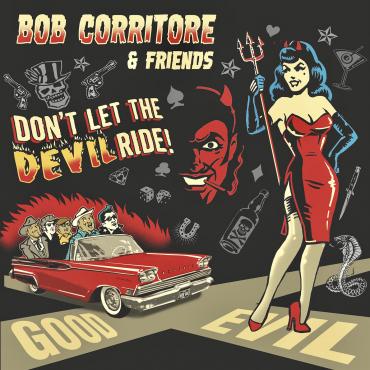Bob Corritore & Friends Create a Perfect Throwback Blues Album

Being a blues lover means always looking behind you. Not so much because you’re scared someone is following you, although that certain factors in for many of us, but because there’s often a sense—a lament, even—that the best blues music has already been made. Many of us go deeper down the hole and even begin to wonder about all of the great blues music that wasn’t recorded and that will never be heard again. Don’t Let the Devil Ride, a project/album led by harmonica player Bob Corritore addresses a lot of these concerns, creating a beautiful throwback album that feels, and more importantly sounds, like it’s from the late 1950s/early 1960s. The blues, as a genre, is sad, but this album, which feels like a lost-and-then-found treasure, will make blues fan happy.
The album is Corritore performing with different singers and bands. While the lineups vary from song to song, with Corritore’s harmonica the only constant between them, the album has an impressively consistent sound. It’s a tribute to Corritore’s ear as a co-producer. The overall sound of the album is enticingly ambient, making you feel like you’re overhearing a performance and contributing to the overall vintage sound of the album. The recording studio room itself is almost a character on the album.
Corritore performs with seven singers across 12 tracks. They’re all great singers, but Oscar Wilson stands out, not just channeling Muddy Waters but practically conjuring him on “Tell Me Mama.” Corritore’s harmonica runs through the song like a low-powered electric current; it’s not enough to kill you but it’s just strong enough that you’re aware it’s there. “Laundromat Blues,” made famous by Albert King, is sung here by Alabama Mike, who sounds more like B.B. than Albert King. The track is sad and rickety, with wild blues piano and stinging guitar, courtesy of Big Jon Atkinson, that makes your fingers hurt empathetically. Here Corritore gets a harmonica sound so deep and resonant, it practically sounds like a saxaphone. “I Was a Fool,” sung by George Bowman, features a sick descending guitar riff also courtesy of Atkinson. The riff is stark and scary; it’s almost Satanic. It’s as heavy and as dark as anything ever performed by Black Sabbath.
The album’s best moment, though, is “The Glide,” sung by Sugaray Rayford. Pianist Fred Kaplan leads the song while Corritore supplies the accents, but it’s the ridiculous, obscene lyrics, ostensibly about a horse, which are impossible to ignore or dislike: “He don’t like no saddle / White Lightning likes to ride bare back / Said he needs to feel everything when he’s being jockeyed / Ain’t Lightning just like that.” It’s just the kind of juvenile lyric and absurd sentiment that makes for a great blues song.
We’re more than halfway through the year and this is very much a contender for album of the year. The performances on the album are great, not for technical reasons, but for essentially spiritual ones. Every musician reaches deep down to tap into something deeper within themselves. It’s not about playing precisely. Instead Don’t Let the Devil Ride is about playing expressively. Sometimes that means the piano sounds like it’s going to roll right out of the song. Sometimes it sounds like the drummer is going to just slowly disappear into the ether. All of these things add personality and texture to the album. Corritore, and his friends, have created a wonderful album that isn’t just a tribute to the blues, but is also an aural embodiment of it.



